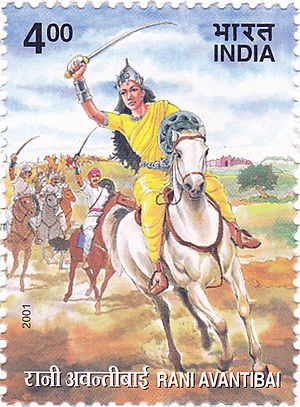Avantibai facts for kids
Quick facts for kids
Avantibai
|
|
|---|---|

Avantibai on a 2001 stamp of India
|
|
| Born | 16 August 1831 |
| Died | 20 March 1858 (aged 26) |
| Nationality | Indian |
Avantibai Lodhi (also known as Avanti Bai Lodhi) was a brave Indian queen and a freedom fighter. She was the queen of Ramgarh, an area now known as Dindori in Madhya Pradesh. Avantibai stood against the British East India Company during the Indian Rebellion of 1857. Much of what we know about her comes from old stories and songs. She is seen as a hero, especially by people from the Lodhi Rajput community.
Early Life and Rule
Avantibai Lodhi was born on August 16, 1831, in Mankehadi village in Seoni district. Her father was Jujhar Singh. She married Prince Vikramaditya Singh Lodhi, whose father, Raja Laxaman Singh, ruled Ramgarh.
Avantibai had two sons, Aman Singh and Sher Singh. In 1851, Raja Laxaman Singh passed away. His son, Vikramaditya, became the new King of Ramgarh. As queen, Avantibai was very good at managing the state's affairs.
When her husband, King Vikramaditya, became unwell, Avantibai took charge. She became the guardian for her young sons and managed the kingdom. She told the farmers in her state not to follow the rules set by the British. This made her very popular among her people.
Fighting for Freedom
When the big Indian Rebellion of 1857 started, Avantibai quickly gathered an army of 4,000 soldiers. She led them herself.
Her first battle against the British happened near Mandla, in a village called Kheri. Avantibai and her army fought bravely and managed to defeat the British forces there.
However, the British were determined to win. They came back with more soldiers and attacked Ramgarh. To keep her people safe, Avantibai moved her forces to the hills of Devharigarh. The British army then set fire to Ramgarh. After that, they followed Avantibai to Devharigarh to attack her again.
Avantibai used a clever fighting style called guerilla warfare. This means her army would make quick, surprise attacks and then hide. She fought hard to defend her land and her people. Sadly, she died fighting on March 20, 1858.
Avantibai's Legacy
Even after India became independent, Avantibai has been remembered as a hero. People tell her story through plays and folk songs.
One folk song from the Gond people, who are forest dwellers in the region, praises her:
The Rani who is our mother, strikes repeatedly at the British. She is the chief of the jungles. She sent letters and bangles to other (rulers, chieftains) and aligned them to the cause. She vanquished and pushed the Britishers out, in every street she made them panic, so that they ran away wherever they could find their way. Whenever she entered the battleground on horseback, she fought bravely and swords and spears ruled the day. O, she was our Rani mother
Avantibai is one of many brave women, called viranganas, who are celebrated for their part in the 1857 rebellion. Other famous examples include Rani Laxmi Bai and Jhalkari Bai.
Even though much of her story comes from folklore, Avantibai's bravery is important. Her story was even included in history textbooks in India starting in 2012.
The Narmada Valley Development Authority honored her by naming a part of the Bargi Dam project in Jabalpur after her.
India Post has also honored Avantibai by issuing two special stamps. The first stamp was released on March 20, 1988, and another on September 19, 2001.
Images for kids
 | DeHart Hubbard |
 | Wilma Rudolph |
 | Jesse Owens |
 | Jackie Joyner-Kersee |
 | Major Taylor |



